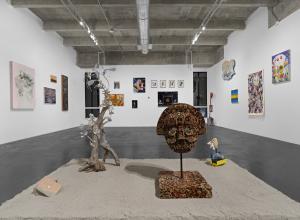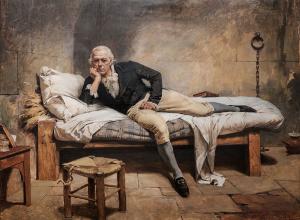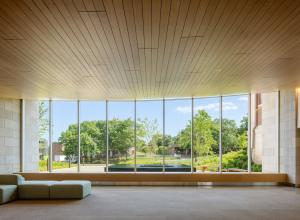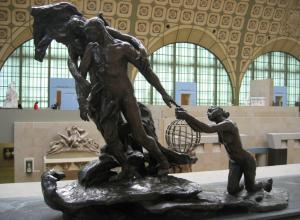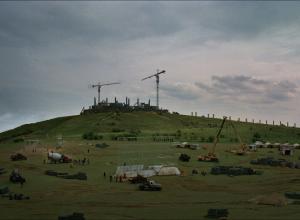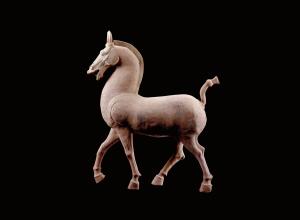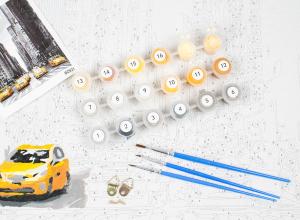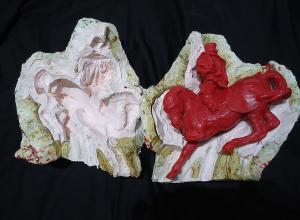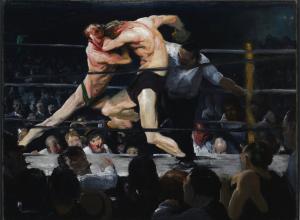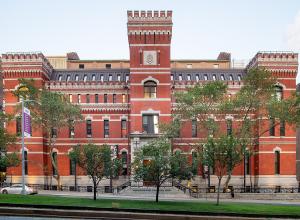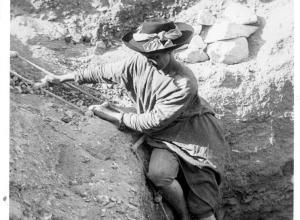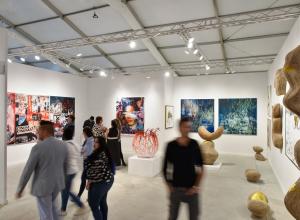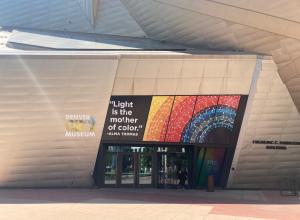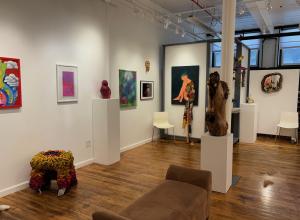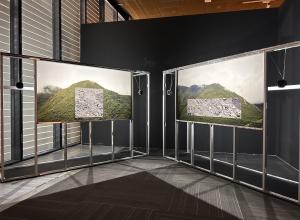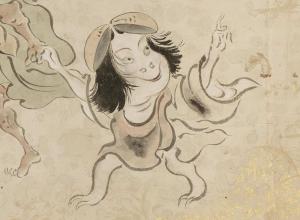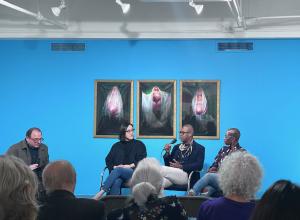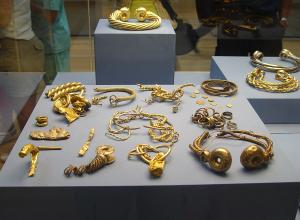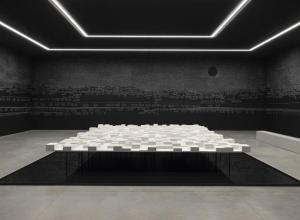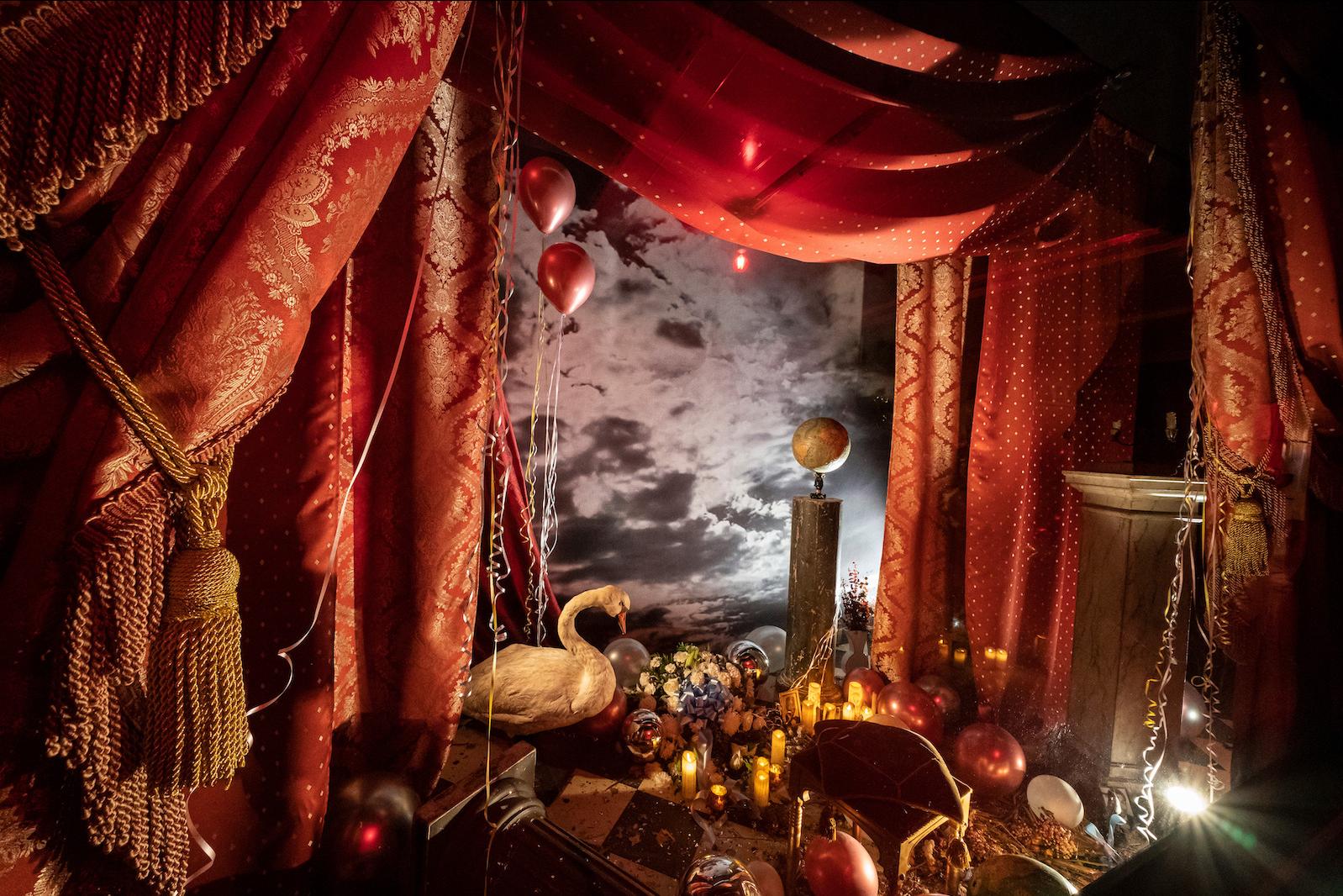
Carrie Mae Weems, The Shape of Things at Park Avenue Armory, 2021. Carrie Mae Weems, It’s Over – A Diorama, 2021. Elements courtesy of Dienst + Dotter Antikviteter.
New York, NY – One of the most eminent image-makers and social commentators in America, MacArthur Fellow Carrie Mae Weems opens today a major new commission and the largest, most significant exhibition of her multidisciplinary artistic practice in the last decade. Throughout her career, Weems has produced a prolific and complex body of work, pushing the boundaries of photography and blurring the line between art and activism. Her new work, The Shape of Things, builds on the convening of the same name and accompanying public programming that Weems hosted at the Armory during her residency in 2017, using art as a lens to probe the political and social issues of the day. Reflecting the “circus-like” quality of contemporary American political life, Weems conjures a dark setting in the Armory’s Wade Thompson Drill Hall with an exhibition that encompasses the breadth of her artistic output—including new multimedia installations and iconic works from the past decade, as well as a performance series and convening of artists. This timely project, which will be situated in the Drill Hall from December 2 through December 31, 2021, was conceived as a platform for collective investigation and reflection on the complexity of the American experience.
Building on the convening and public programming developed as part of the 2017 collaboration between Weems, curator Avery Willis Hoffman, and the Armory, The Shape of Things incorporates a three-day convening in a nod to what has become a trademark of Weems’ practice. This gathering of performers, thinkers, and activists, entitled Land of Broken Dreams will explore what it is to be American in this time of turmoil and disruption through conversation, interventions, and engagements throughout the exhibition and the building. Spanning three days, the convening will feature a robust lineup of discussions and performances including Sarah Elizabeth Lewis, Jawwaad Taylor, Deborah Willis, and Agnes Gund. Over the course of these three days, renowned artists, poets, thinkers, singers, dancers, musicians, such as Radcliffe Bailey, Nona Hendryx, Jason Moran, Julie Mehretu, Shirin Neshat, and Tyler Mitchell, will activate the Armory with spirited discussions and performances, including concerts with Somi, Vijay Iyer, and Terri Lyne Carrington with Lisa Fischer.
“I am fascinated by nineteenth century media, so for the Drill Hall I created a cyclorama that contains a new film that pits the rise of the right along with its puppeteers, clowns, jokers and two-faced speakers & spies, charlatans & prophets of fake news, conspiracy theorists against the emerging forces of progress. In this world, ‘normal’ is turned on its head and all bets are off,” said Carrie Mae Weems. “It is a time of murder, mayhem and mass protest and when covert operators of corruption bear their heads for all to see. My work centers on what happens when all facades are stripped away, and the people are left standing face to face with the realities of our time.”
Celebrated for her insightful photography, investigations of social dynamics, and ability to convene leading thinkers and artists through her work, Weems presents major new works alongside existing works that explore the circus of politics and, in Weems’ words, “the push for a just society, along with the starts and stops on the long slow road towards progress.” At the center of the exhibition is a new, large-scale video installation evoking a 19th-century cyclorama that offers new film material by Weems with original music by Jawwaad Taylor. Other installation elements include a large-scale photographic installation; a memorial wall dedicated to victims of anti-Black violence; Lincoln, Lonnie, and Me (2012), a “Pepper’s Ghost” illusion with music by Jason Moran, the longtime curator for the Armory’s Artists Studio Series; and additional sculpture and installation works suggestive of a 19th-century side-show, including a peep show and dioramas.
ABOUT CARRIE MAE WEEMS
Carrie Mae Weems (b. 1953, Portland, OR) is widely renowned as one of the most influential contemporary American artists living today. Over the course of nearly four decades, Weems has developed a complex body of work employing text, fabric, audio, digital images, installation, and video, but she is most celebrated as a photographer. Activism is central to Weems’ practice, which investigates race, family relationships, cultural identity, sexism, class, political systems, and the consequences of power. Over the last 30 years of her prolific career, Weems has been consistently ahead of her time and an ongoing presence in contemporary culture. Her work is organized into cohesive bodies that function like chapters in a perpetually unfolding narrative, demonstrating her gift as a storyteller. The Kitchen Table Series (1990), one of Weems’ most seminal works, is widely considered one of the most important bodies of contemporary photography. Through her work, Weems tackles a number of complex contemporary issues, demanding reconsideration of predominant narratives throughout our history.
Weems has participated in numerous solo and group exhibitions at major national and international museums including the Metropolitan Museum of Art, The Frist Center for Visual Art, Solomon R. Guggenheim Museum in New York, and the Centro Andaluz de Arte Contemporáneo in Seville, Spain. She is represented in public and private collections around the world, including the Metropolitan Museum of Art, NY; The Museum of Fine Arts, Houston; the Museum of Modern Art, NY; Museum of Contemporary Art, Los Angeles; and The Tate Modern, London.




